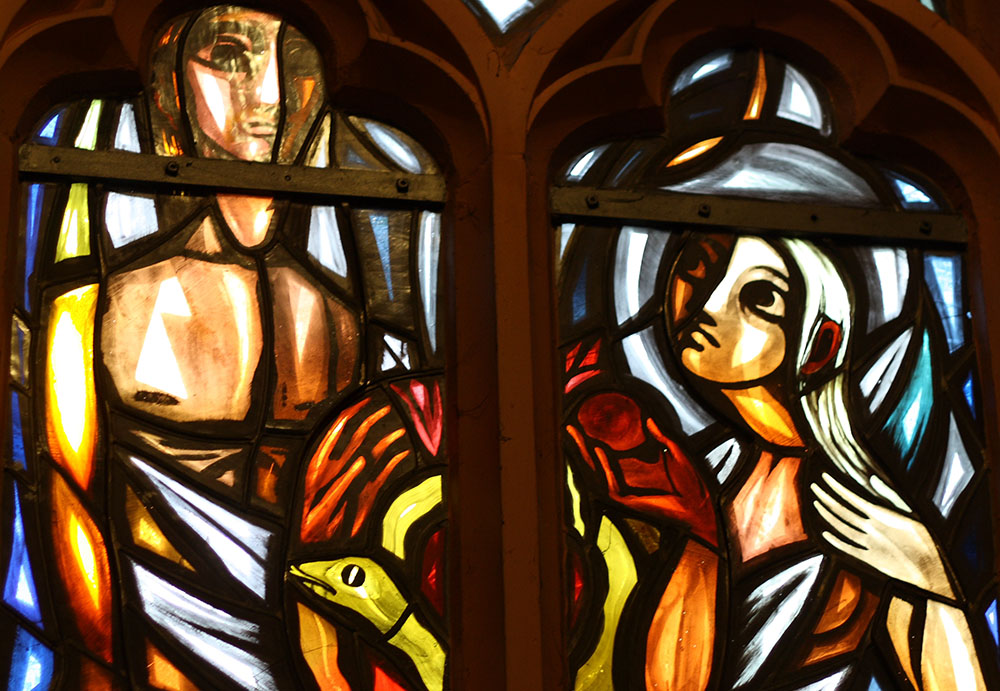
Adam and Eve depicted in stained glass in St. Heribert Catholic Church in Kreuzau, Germany (Wikimedia Commons/Reinhardhauke)
The verdant valley and hill across the road from the veranda of our convent reminds me of the valley near Mount Golgotha in Jerusalem, the Kidron Valley.
In the history of the church, we first had one garden — the Garden of Eden — but later, through unfaithfulness, sin or disobedience, the Garden of Gethsemane became the limelight.
My reflection led me to the Garden of Eden (Genesis 3:1-8). We have read and heard this passage many times. Does this at times remain just information/knowledge to us as it is read? or as Jeremiah says (Jeremiah 23:29), Is not my word like fire says the Lord, like a hammer that breaks the rock [the self] in pieces, so that it can work his purpose in our life?
In the conversation between Eve and the serpent we find the enchanting offers or promises:
Did God really tell you not to eat?
You certainly will not die.
Your eyes will be opened.
You will be like God, knowing good and evil.
And the downfall: She saw, desired and ate it.
And thus the desire, doubt, disbelief (Did God really tell you?) and disobedience resulted in spiritual death.
I thought more about doubt: when Peter lost faith and began to sink (Matthew 14:30-31); when James (1:6) says, But ask in faith, never doubting, for the one who doubts is like a wave of the sea driven and tossed by the wind. For the doubter, being double-minded and unstable in every way, must not expect to receive anything from the Lord.
My reflection took me still deeper: The woman saw and it was delight to her eyes. She desired it. As when King David sinned with Bathsheba (2 Samuel 11), he saw her and desired to have her, could not control his passions.
Eve — deceived and disobedient — ate and gave it to Adam, as when Delilah tricked Samson, who was deceived by his true love, sent by the Philistines to destroy him (Judges 16:4-30).
Advertisement
Then there are the temptations of Jesus in the wilderness after his 40-day fast, with Satan promising worldly allurements (Matthew 4:1-11). Jesus counteracts and defends with the word of God, highlighting his relationship with his Father and his knowledge of Scriptures.
So Eve's desire, doubt and disbelief had devastating results. Desire crept in as the serpent created doubt in the woman, and she disbelieved what God told them. When finally enticed, the woman saw that the tree was good for food — pleasing to the eyes and desirable for gaining wisdom — she took some of its fruit and ate it, and disobeyed God. Consequently, she fell prey to the tactics and allurements of Satan.
So, when the presence of God is no longer in us, we become weak, and the need for things, power, position and security arises. We begin to feel insecure. When Adam and Eve were with God, these things did not matter to them. But once they consented, they fell prey to the tactics of the evil one and got deceived because they did not believe in his word.
Yet, the compassionate God came in search of Adam, calling out, Where are you? Have you eaten of the tree of which I commanded you not to eat? (Genesis 3:9-11), while Adam hears the footsteps of God and hides!
I have many questions: Why does Adam hide? Had not Adam seen God before? Did Adam not hear the footsteps of God whenever he came to the garden? How did Adam know that he was naked?
I realize that when Adam was with God, all these things were immaterial. Earlier, Adam saw all these through the eyes of God. But now suddenly there is a change. And these things became important. Why? Because they were coming from the evil one, not from God.
Another thing that catches my attention is the search by God: Where are you?
Does God mean place? Is it a physical place? I think not. Rather, it is the state in which I am — my relationship with God. God came in search of Adam and Adam hides. Why does he hide? Because he was afraid to walk with God; he was naked; now he was able to see through the eyes of the evil one and failed the purpose of being in relationship with God.

The verdant valley and hill across the road from the veranda of our convent reminds me of the valley near Mount Golgotha in Jerusalem. (Courtesy of Molly Fernandes)
We may hear a voice telling us, Now, don't worry, you are also seeking God, you know the Scriptures, you have knowledge, you pray ... and so on. But my search for God can get clouded or I can be led astray.
Nicodemus, a Pharisee and a member of the Sanhedrin, came to meet Jesus by night. Night signifies darkness, darkness of heart. Jesus confronted him (John 3:10), saying: You are a rabbi, or Israel's teacher — meaning, You still don't know me after all your study of Torah? Where are you in your relationship with God?
Mary comes to the tomb in early morning — bends to see, weeps, talks to the gardener. But she did not recognize Jesus (John 20:11-14). But the Bible does not elaborate on why — because she was filled with sorrow, grief, her vision was clouded with tears?
Do we recognize and hear his voice? It can also happen to us: Our eyes are sometimes full of tears, we have problems. Instead of searching for God, we keep brooding over all that is immaterial: self-pitying, justifying and defending ourselves.
Where am I in my relationship with God? What are the things I am hiding from God, like Adam did?
Do I have a Delilah in my life for whom I am ready to let go of my strength, like Samson did? In what do I find my security — in my own strength, status? Do I lose focus, like Peter, before he sank into the water?
In my quest for God, where am I in my relationships at my workplace, in community life and in my life of holiness? For abiding in Jesus means rooting his word in my heart, creating intimacy with him through worship, surrounding myself with others who love him, allowing him to work in and through my life, and obeying him. It means being willing to listen to those needing an ear of empathy, to walk and work together for a greater mission, to establish God's kingdom!
So I — like the prodigal son, after squandering everything that mattered to him, came to his senses and returned to the Father — I must restore my relationship with God our Abba Father. This demands sacrifice, suffering, penance or chastisement, and saying no to my wishes and desires…to be the grain of wheat that dies, gets rooted, and grows to yield more.







